|
|
|
Sort Order |
|
|
|
Items / Page
|
|
|
|
|
|
|
| Srl | Item |
| 1 |
ID:
192174
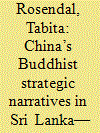

|
|
|
|
|
| Summary/Abstract |
While the economic impact of China’s ‘Belt and Road’ Initiative (BRI) in Sri Lanka has been closely monitored in recent years, few studies have focused on the role of China’s Buddhist narratives in furthering the countries’ interests. By analyzing the Buddhist strategic narratives used in official Chinese and Sri Lankan statements, this article argues that under the BRI’s ‘people-to-people’ bonds, Chinese and Sri Lankan officials have used the Buddhist history and exchanges between the two nations to advocate for BRI projects, and to strengthen their cultural ties. This article finds, more narrowly, that China’s Buddhist diplomacy in Sri Lanka has increased since the BRI’s inception, and that it has focused on enhancing bilateral relations and mitigating criticism of projects. China’s strategic narratives have been somewhat successful, but since they are employed alongside economic investments, their precise impact is difficult to measure. More broadly, the CCP is increasingly positioning itself and the BRI through religious strategic narratives to mitigate criticism and further its interests and stature in the international system. However, while China’s projection of Buddhist strategic narratives, in tandem with infrastructure investments, may ensure the BRI’s continued implementation, this depends on the willingness of host countries of accepting these narratives.
|
|
|
|
|
|
|
|
|
|
|
|
|
|
|
|
| 2 |
ID:
161270
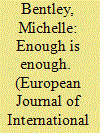

|
|
|
|
|
| Summary/Abstract |
The clash between national security and civil rights comprises one of the most controversial aspects of counter-radicalisation strategy. Analysts present this as a conflict between the need for restrictive security measures (for example, surveillance) and the need to uphold civil liberties (for example, privacy and freedom of speech). In responding to this dilemma, the article examines how this binary normative struggle impacts on the rhetorical presentation of counter-radicalisation policies – in particular, the UK Prevent Strategy and the rhetoric employed by UK Prime Minister and former Home Secretary, Theresa May. It argues that the normative environment has obliged May to construct rhetoric within the context of, what is termed here, normative invalidation. In facing two comparably compelling and related norms of action, May is necessarily required to invalidate or neutralise any norm not adhered to as an essential characteristic of rhetorical strategy. This is discussed in relation to the Strategic Narratives
|
|
|
|
|
|
|
|
|
|
|
|
|
|
|
|
| 3 |
ID:
183708
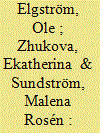

|
|
|
|
|
| Summary/Abstract |
Drawing on the IR theories of norm translation and strategic narratives, this article focuses on how states translate international norms to their own advantage by producing strategic narratives to advance their soft power ambitions abroad. Using the example of feminist foreign policy (FFP), the article compares Sweden, Canada, France, and Mexico in their attempts to translate international feminist norms into their countries’ strategic narratives. This comparison is based on three strategic narrative types (issue, national, and international system narratives) and two types of feminism (liberal, intersectional). Issue narratives reveal that Sweden and Mexico give more priority to social policies, while France and Canada emphasise the role of the market in addressing gender inequality. International system narratives demonstrate that Sweden and Mexico perceive global challenges as drivers of gender inequality, while France and Canada see gender inequality as a cause of global problems. National narratives show that Sweden and Mexico refer to other FFP countries to ‘back up’ their feminist initiatives, while France and Canada do not relate to other states. Finally, while liberal feminism dominates all four FFPs, each state either prioritises particular aspects of it (legal, market, security, rights-based) or incorporates elements from intersectional feminism.
|
|
|
|
|
|
|
|
|
|
|
|
|
|
|
|
| 4 |
ID:
145094
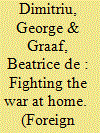

|
|
|
|
|
| Summary/Abstract |
This paper analyzes the Dutch deployment in Uruzgan between 2006 and 2010 with an eye to the challenge of garnering public support for protracted military missions abroad. The hypothesis is that public support can be shaped and sustained by strategic narratives regarding the use of force. Ringsmose and Børgesen's model on strategic narratives is discussed and tested, and expanded in two ways. First, by including the role of “counternarratives,” that is, of narratives presented by factions that oppose deployment decisions. Our data suggest that narrative dominance (the combination of narratives and counternarratives) accounts for the waxing and waning of public support for a given mission. Second, the nexus between negative narrative dominance and the ensuing drop of public consent will be teased out. Using the notion of “elite responsiveness,” we demonstrate when and how weak strategic narratives trigger a political fallout.
|
|
|
|
|
|
|
|
|
|
|
|
|
|
|
|
| 5 |
ID:
153337
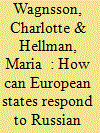

|
|
|
|
|
| Summary/Abstract |
How can European democratic states respond to Russian information warfare? This article aims to enable and spur systematic research of how democracies can respond to the spread of distorted information as part of information warfare. The article proposes four ideal-type models representing different strategies that democratic governments can employ; blocking, confronting, naturalising and ignoring. Each strategy is illustrated by ways of empirical examples of strategies applied by European states in view of what is regarded as an unwelcome Russian strategic narrative that is spread as part of information warfare. We problematise each strategy and explore reasons for why states choose one strategy over another. We then explore how different strategies might contribute to destabilise or stabilise the security environment and how they resonate with democratic values. Finally, we contribute to theorising on strategic narratives by highlighting that the choice of strategy will influence states in their formation of strategic narratives. We thus further theorising on strategic narratives by highlighting the link between strategies and narratives, thus identifying one central dynamic in how narratives are formed.
|
|
|
|
|
|
|
|
|
|
|
|
|
|
|
|
| 6 |
ID:
166891
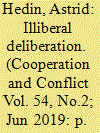

|
|
|
|
|
| Summary/Abstract |
Much social theory takes for granted that transnational people-to-people dialogue is inherently liberal in process and content – a haven of everyday authenticity that shelters ideas of human rights and democratic reform. In contrast, this contribution shows how communist regimes built and institutionalised an encompassing administrative state capacity to control and shape micro-level professional contacts with the West. This extensive but secret system of coercion, which was brought to light only with the opening of former communist regime archives, set a markedly illiberal framework for everyday East–West deliberations during the Cold War. Effectively, the travel cadre system may not only have delayed the demise of Soviet bloc communism, by isolating the population from Western influences. It was also intended to serve as a vehicle for the discursive influence of Soviet type regimes on the West. The article provides one of the first and most detailed English language maps of the administrative routines of a communist regime travel cadre system, based on the East German example. Furthermore, drawing on social mechanisms methodology, the article sets up a micro-level ‘how it could work’ scheme over how travel cadre systems can be understood as a state capacity, unique to totalitarian regimes, to help sway political discourse in open societies.
|
|
|
|
|
|
|
|
|
|
|
|
|
|
|
|
| 7 |
ID:
153263
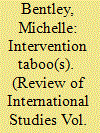

|
|
|
|
|
| Summary/Abstract |
Intervention comprises one of the most contentious issues in International Relations. This controversy results from the way normative understanding is structured around two key, but mutually exclusive, taboos: the moral expectation to respond in cases of humanitarian need and the protection of state sovereignty. In examining this dilemma, this article asks: what happens to the construction of rhetorical strategy, where that strategy seeks to justify intervention (or not), within a binary normative environment? It is argued that actors can only successfully construct a rhetorical case by engaging in, what is termed here, normative invalidation. In a binary situation, actors cannot adhere to both taboos. These taboos are so compelling, however, that actors must necessarily invalidate or neutralise any taboo not adhered to. This is discussed in relation to the Strategic Narratives paradigm and comparative case studies on the presidential rhetoric of Bill Clinton and Barack Obama.
|
|
|
|
|
|
|
|
|
|
|
|
|
|
|
|
| 8 |
ID:
181659
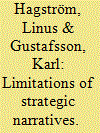

|
|
|
|
|
| Summary/Abstract |
Recent research has explored how the Sino-American narrative struggle around COVID-19 might affect power shift dynamics and world order. An underlying assumption is that states craft strategic narratives in attempts to gain international support for their understandings of reality. This article evaluates such claims taking a mixed-methods approach. It analyzes American and Chinese strategic narratives about the pandemic, and their global diffusion and resonance in regional states that are important to the U.S.-led world order: Australia, India, South Korea, Turkey, and the United Kingdom. While the article confirms that strategic narratives remain a highly popular policy instrument, it argues that their efficacy appears limited. Overall, the five states in question either ignored the Sino-American narrative power battle by disseminating their own strategic narratives, or they engaged in “narrative hedging.” Moreover, even China’s narrative entrepreneurship was enabled and constrained by pre-existing master narratives integral to the current U.S.-led world order.
|
|
|
|
|
|
|
|
|
|
|
|
|
|
|
|
| 9 |
ID:
192611
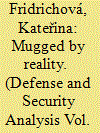

|
|
|
|
|
| Summary/Abstract |
This article discusses the surprising lack of preparedness in Russian propaganda preceding the invasion of Ukraine on February 24, 2022. Despite previous successes in developing strategic narratives during the annexation of Crimea, Russia underestimated the need for unique communication strategies for the conflict in Ukraine. The article argues that Russia's miscalculation was due to the assumption that it already had a set of strategic narratives in place, from the international order to specific issues, and viewed the conflict as a continuation of the story it had already told. However, increased scrutiny from Western media and academia led to a reexamination of assumptions and attitudes towards the region. Instead of Russia adapting its strategic narrative for a Western audience, it fell back on the existing one, further alienating the audience. This chapter highlights the importance of strategic narrative in international conflicts and its complex relationship with audience perception.
|
|
|
|
|
|
|
|
|
|
|
|
|
|
|
|
| 10 |
ID:
180347
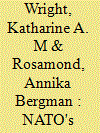

|
|
|
|
|
| Summary/Abstract |
Angelina Jolie's high-profile visit to NATO in 2018 signals a move to brand the alliance's strategic narrative within the language of celebrity through engagement with popular culture. The partnership represents a significant change in the alliance's approach to global security. It also builds on a shift in NATO's self-narrative through the advocacy of gender justice related to the Women, Peace and Security (WPS) agenda. Rather than fading into the background, NATO appears to be pursuing the limelight for the purpose of ‘awareness raising’ as a tool to implement the WPS agenda. Drawing upon feminist scholarship on the WPS agenda, NATO, and research on celebrity humanitarianism and politics, we provide a critical study of this change in NATO's strategic narrative, through the analysis of visual and textual material related to Jolie's visit to NATO. Our focus is on the significance of this partnership and its contribution to legitimising the alliance's self-defined ‘military leadership’ in the area of conflict-related sexual violence. While Jolie's visit to NATO opened the alliance to public scrutiny it also symbolised a form of militarism, surrounded by orchestrated visual representations. As such, it only marginally disrupted the militarist logic present in NATO's wider WPS engagement.
|
|
|
|
|
|
|
|
|
|
|
|
|
|
|
|
| 11 |
ID:
179941
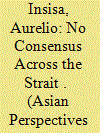

|
|
|
|
|
| Summary/Abstract |
After the 2016 elections, cross-Strait relations have fallen to their lowest point since the Third Strait Crisis. A proliferation of state-driven strategic narratives by both sides has since emerged. Against Beijing's narratives of "national rejuvenation," peaceful reunification, and "1992 Consensus," the Tsai administration has contraposed an image of Taiwan as a "beacon" of freedom and democracy in the Indo-Pacific. By tracing the tenets and the operationalization of Beijing and Taipei's strategic communications from the late 2000s to 2020, this article shows how Chinese and Taiwanese actors' reactions to the systemic pressure of a shifting East Asian regional order have progressively shaped cross-Strait communicative dynamics, severely constraining the range of options that could overcome the current impasse.
|
|
|
|
|
|
|
|
|
|
|
|
|
|
|
|
| 12 |
ID:
108769
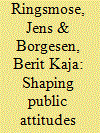

|
|
|
|
|
| Publication |
2011.
|
| Summary/Abstract |
This article seeks to explain variations in public support for the deployment of military troops to Afghanistan by means of the strategic narratives employed by national governments. Focusing on the UK, Canada, the Netherlands and Denmark, we argue that strong narratives about the why-what-and-how of overseas military missions increase the likelihood of popular support, while weak story lines are likely to result in a souring public opinion environment. Contrary to most current studies of public opinion and the support for international missions, we thus emphasise the role played by political leaders in shaping public attitudes towards the projection of military power. Surely, politicians are affected by polls and the wishes of public opinion - but popular attitudes are far from immune from political elites' attempts to rationalise the use of military force via strategic narratives.
|
|
|
|
|
|
|
|
|
|
|
|
|
|
|
|
| 13 |
ID:
160689
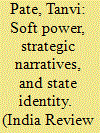

|
|
|
|
|
| Summary/Abstract |
In 2011, India and Afghanistan signed the Strategic Partnership Agreement that delimited cooperation in economic, social, political, and cultural areas. It depicted the rise of Indian soft power influence. However, the extent to which India garners strategic influence in Afghanistan through soft power remains contentious. This article contends that India’s soft power effectiveness in Afghanistan post-2011 can be fully grasped only via the construction and reception of India’s regional power identity negotiated at the sites of: “civilization,” “democracy,” and “economic-military” enabling India to provide a regional leadership that can forward both India and Afghanistan’s mutual interests. Examining soft power via the constructivist-discursive framework of collective identity strategic narrative, this article compares India-Afghanistan relations in periods 2011–14 and 2014–17. The former formalized strategic partnership agreement and the latter marked continuation of the agreement albeit through domestic political transitions in both countries. This article demonstrates that the Indian soft power influence in Afghanistan between 2014 and 2017 has increased markedly.
|
|
|
|
|
|
|
|
|
|
|
|
|
|
|
|
| 14 |
ID:
195371


|
|
|
|
|
| Summary/Abstract |
Strategic narratives are employed by political actors as tools to pursue their goals, constructing a shared meaning of the past, present, and future in order to shape behaviour. Building on discourse analysis of the magazine Dabiq and from in-depth, semi-structured interviews conducted between 2018 and 2019 with IS civilian employees and civilians living in IS-controlled territory, we analyse how IS organised its strategic narrative of governance and statebuilding around three main themes considered as central in the statebuilding literature – the provision of security, the provision of basic services, and social cohesion – and how such a strategic narrative was received by citizens living in IS-controlled territory. We argue that the study of strategic narratives of governance and statebuilding casts light on the factors leading to the success or demise of emergent statebuilding efforts, equally demonstrating how IS’s project is quite conventional when compared to other mainstream statebuilding narratives.
|
|
|
|
|
|
|
|
|
|
|
|
|
|
|
|
| 15 |
ID:
193963


|
|
|
|
|
| Summary/Abstract |
The last few years have seen the emergence of a cybersecurity regime complex divided into specialized forums discussing different sub-issues. But how do the main actors in cyberspace make sense of its fragmented governance, and how does that translate to their broader strategic narratives? Furthermore, to what extent are these in line with the predominant macro-narratives in the cyber-domain? To answer these questions, this article explores the strategic narratives of the European Union, Russia, and India in two of these specialized forums: one related to responsible state behavior in cyberspace, the other to cyber-crime. Through the study of narrative fragments — a new approach to the study of strategic narratives in multilateral settings — it concludes that these actors largely include these two issues within their broader strategic narratives. This highlights the importance of cross-issue analysis in the study of multilateral arrangements, particularly in the context of emerging regime complexes.
|
|
|
|
|
|
|
|
|
|
|
|
|
|
|
|
| 16 |
ID:
163599
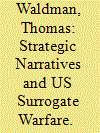

|
|
|
|
|
| Summary/Abstract |
The way US rationales for delegating military tasks to proxy forces are communicated and perceived contributes to strategic outcomes.
|
|
|
|
|
|
|
|
|
|
|
|
|
|
|
|
| 17 |
ID:
177072
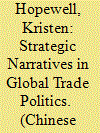

|
|
|
|
|
| Summary/Abstract |
The characterization of the United States as a liberal hegemon seeking to uphold free-market capitalism against the illiberal state capitalism of China and other emerging powers has become commonplace, along with the attendant notion that American economic openness has been exploited by the unfair trade practices of other states. Given their dominance in US political discourse and role in shaping contemporary policy—including fuelling Trump’s trade wars and aggressive unilateral trade actions against all of the United States’ major trading partners, his attacks on the World Trade Organization, and talk of a “new Cold War” between the United States and China—these claims merit far greater scrutiny. In this article, I challenge the stark dichotomy frequently drawn between American “free-market capitalism” and the “state capitalism” of its emerging challengers, arguing that this forms part of a strategic narrative deployed for political purposes, including legitimating the United States’ use of aggressive trade policy measures. An examination of the American hegemon’s actual trade and industrial policies complicates this characterization. Despite presenting itself as a promoter and defender of free trade, I show that the unifying logic of US trade policy has always been the promotion of American economic interests: the United States has engaged in considerable state intervention and trade protectionism, both to shield vulnerable industries and support others to achieve and maintain their global dominance.
|
|
|
|
|
|
|
|
|
|
|
|
|
|
|
|
| 18 |
ID:
179092
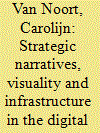

|
|
|
|
|
| Summary/Abstract |
Visual communication is at the heart of international relations in the digital age. Using a range of media tools, political elites communicate so-called ‘strategic narratives’ to persuade and influence the behaviour of target audiences. The existing body of research on ‘strategic narratives’ examines both spoken and written messages. While an academic focus on visual texts is emerging, limited attention has been given to the visualization of peaceful topics such as infrastructure projects. This paper examines the ontological and methodological foundations of ‘strategic narratives’, ‘visuality’, and ‘infrastructure’, to ascertain what seeing strategic narratives on infrastructure means in the study of global politics. The theoretical claims are demonstrated using the case study of China’s Maritime Silk Road Initiative. Herein, it is shown how China communicates strategic narratives on infrastructure to persuade target audiences of its foreign policy priorities, and to secure its self-concept. This communication process is supported by images in the digital sphere.
|
|
|
|
|
|
|
|
|
|
|
|
|
|
|
|
| 19 |
ID:
187504
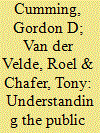

|
|
|
|
|
| Summary/Abstract |
Strategic narratives now face unrealistic expectations as to what they can achieve in the military field. This article asks when and how such narratives lose traction during protracted military interventions. To address these questions, which are crucial at a time when so much modern warfare takes place in the “fourth” dimension, this study develops a conceptual framework that focuses initially on the weakening of a narrative’s content and, subsequently, on its loss of normative resonance and verisimilitude. The latter two factors are beyond the control of even the most skilful strategic narrator, particularly where narratives are required to appeal to audiences with different norms. Our framework is applied to the case of France’s military operations in Mali (Serval) and the Western Sahel (Barkhane). It finds that, whereas France’s compelling Serval narrative was congruent with strong French and Malian public backing, its Barkhane narrative weakened over time, resonating less with prevailing societal norms, becoming less attuned to events on the ground and ultimately coinciding with a sharp decline in public support in France and Mali. It concludes that strategic narratives afford agency to policymakers but are constantly open to contestation and struggle to cope with diverse audiences and deteriorating “evenemential” contexts.
|
|
|
|
|
|
|
|
|
|
|
|
|
|
|
|
| 20 |
ID:
168961
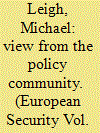

|
|
|
|
|
| Summary/Abstract |
Reflecting on the results presented in articles in this special issue, European leaders should take greater account of external perceptions in crafting the European Union's strategic narrative and guiding its actions. Failure to do so has impaired external policies like the Euro-Mediterranean Partnership, the European Neighbourhood Policy and Eastern Partnership. Leaders emerging from the Arab uprisings perceived the EU as complicit with their countries’ former anciens régimes and Russian leaders see EU support for democracy and the market economy in former Soviet states as duplicitous and instrusive. Awareness of such perceptions should be filtered into EU decision-making, without validating views that European officials and diplomats consider misleading.
|
|
|
|
|
|
|
|
|
|
|
|
|
|
|
|
|
|
|
|
|